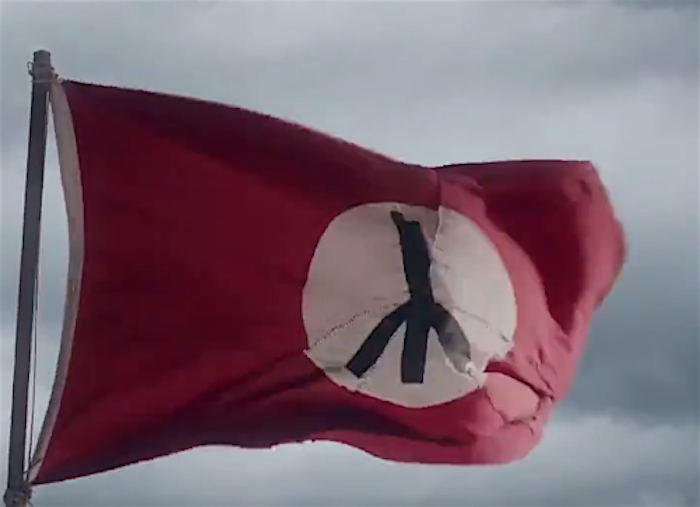The Man in the High Castle will return on October 5th…and it’s already been renewed for a fourth season! The dystopia takes place in a timeline where the U.S. lost World War II, and was subsequently divided between a Nazi Annex in the East, and a Japanese colony in the West. The show hosted a lively panel at San Diego Comic-Con featuring actors Alexa Davalos, Rufus Sewell, Stephen Root, and Jason O’Mara, and executive producers Isa Dick Hackett and Dan Percival, showed an extended clip of Season Three, and discussed the difficulties of creating alternate timelines.
I’ve rounded up some panel highlights below!
- Apparently the Nazis have learned they’re in a multi-verse… which means there are more worlds to conquer. Not good.
- Rufus Sewell’s Obergruppenfuhrer John Smith has to become even more dedicated to his Nazism, because “there’s no retiring from the Reich.”
- Meanwhile, Stephen Root said that his character, the titular Man in the High Castle, will have to decide whether to step us the leader of the Resistance.
- Speaking of the Resistance, a new character is joining the cast: Jason Omara’s Wyatt is an Irish immigrant who makes a life in the Neutral Zone, but who might have to choose a side after he meets Juliana Crane.
- And speaking of Juliana, Alexa Davalos herself said that she was inspired by her character because she “lives with love.”
- Season three will not only focus more on the nascent Resistance, it will also dig into the metaphysical science fiction that is a hallmark of all of Dick’s work. His daughter, executive producer Isa Dick Hackett, told the crowd that this season will draw on several chapters her father wrote toward a sequel to High Castle.
- Pop culture presents a slight problem for the show, as they have to imagine a timeline without the rise of rock & roll or the mainstreaming of underground film. Dan Percival also noted that costumes have labels saying “Touched by Aryan hands only”—replicating tags used by actual Nazis in the 1930s and 40s.
- Finally, The Man in the High Castle has already been renewed for a fourth season!
There are so many possibilities for alternate worlds here, and so many more questions to answer! Will John Smith ever reunite with his son? Will Juliana find a world where the U.S. won the war? And where is the Man getting all of his film reels? Hopefully we’ll get at least a few answers this October.











I gave up after season 1, as I felt it wasn’t even close to being an accurate adaptation. Sure, Blade Runner inverted the message of Do Androids Dream, but at least it was having the right conversation. High Castle the book is a metaphysical interrogation of the idea of whether or not theological evil exists, not a “what if”, bang bang, suspense thriller. Season 1 seemed to me to miss the entire point. I guess it’s encouraging that Isa says the show will be getting more into metaphysics, but I don’t know if I have the patience to sit through any more episodes that don’t rise above the level of a Dick Wolfe thriller. I’d also like to point out that PKD wasn’t a writer who was interested in the idea of a multiverse, the way Moorcock is, or Charles Stross’s Merchant Princes, or Keith Laumer’s Worlds of the Imperium. What Tagomi is in when he changes reality and sees The Embarcadero, isn’t a parallel universe, it’s the right universe. PKD’s idea was that somehow time had gone wrong, and the world of The Grasshopper Lies Heavy is the real world, the only real world. Something similar had happened in Keith Roberts’ brilliant Pavanne, and Connie Willis even takes a stab at the concept in Blackout/All Clear. In the High Castle novel this deals with another question which interested the author: who really won the war, anyway?